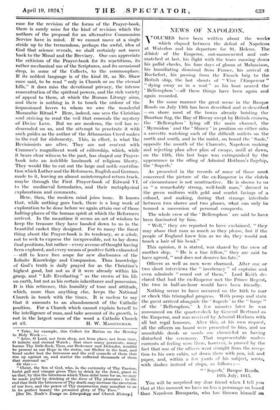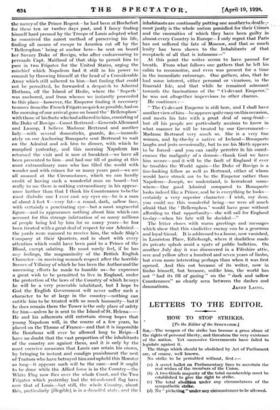NEWS OF NAPOLEON.
VOLUMES have been written about the weeks which elapsed between the defeat of Napoleon at Waterloo and his departure for St. Helena. The debdele of the Emperor, out-manoeuvred and out,- matched at last, his flight with the tears running down his pallid cheeks, his four days of gloom at Malmaison, his humiliating dismissal from France, his arrival at Rochefort, his passing from the French brig to the British ship, the last shouts of " Vive l'Empereur " " dying away as in a wail " as his boat neared the Bellerophon '—all these things have been again and again recorded.
In the same manner the great scene in the Basque Roads on July 15th has been described and re-described —on shore most of the towns already hoisting the Bourbon flag, the Bay of Biscay swept by British cruisers, the • Bellerophon ' lying off the main channel, the Myrmidon ' and the Slaney ' in position on either side, a corvette watching each of the difficult outlets on the north and south, and in the midst, on board the Saale,' opposite the mouth of the Charente, Napoleon making and rejecting plan after plan of escape, until at dawn, on the 15th, this last hope was extinguished by the appearance in the offing of Admiral Hotham's flagship, the Superb.'
As presented in the records of some of those most concerned the picture of the ex-Emperor in the clutch of circumstance is not unattractive. He is shown to us as " a remarkably strong, well-built man," dressed in the green uniform with gold and scarlet facings of a colonel, and making, during that strange interlude between two shores and two phases, -what can only be termed a succession of personal conquests.
The whole crew of the ' Bellerophon ' arc said to have been fascinated by him.
" Well," they arc reported to have exclaimed, " they may abase that man as much as they please, but if the people of England knew him as we do, they would not touch a hair of his head."
This opinion, it is stated, was shared by the crew of another ship. " He is a fine fellow," they are said to have agreed, " and does not deserve his fate."
Officers as well as men were charmed. After one or two short interviews the " inveteracy " of captains and even admirals " oozed out of them." Lord Keith de- clared that had the ex-Emperor met the Prince Regent, the two in half-an-hour would have been friendly.
Nothing seems to have occurred on the 16th to mar or check this triumphal progress. With pomp and state the guest arrived alongside the Superb ' in the " barge " of -the `.Bellerophon.' A fcw minutes later he was announced on the quarter-deck by General Bertrand as the Emperor, and was received by Admiral Hotham with all but regal honours. After this, at his own request, all the officers on board were presented to him, and no unsuitable deeds or words arc chronicled as having disturbed the ceremony. That unpresentable under- currents of feeling were there, however, is proved by the fact that one of the officers went straight from the recep- tion to his own cabin, sat down there with pen, ink and paper, and, within a few yards of his subject, wrote, with dashes instead of stops, as follows :- " Superb,' Basque Roads.
• 16th July, 1815.
You will be surprised my dear friend when I tell you that at this moment we have no less a personage on board than Napoleon Bonaparte, who has thrown himself on the mercy of the Prince Regent—he had been at Rochefort for these ten or twelve- days past, and I fancy finding himself hard pressed by the Troops of Louis adopted what he conceived the surest method of preserving his life, finding all means of escape to America cut off by the Bellerophon ' being at anchor here—he sent on board her Savary Duke of Rovigo, who after endeavouring to persuade Capt. Maitland of that ship to permit him to pass in two Frigates for the United States, urging the mischief which Napoleon had it still in his power to commit by throwing himself at the head of a Considerable Army which still adhered to him—but finding that could not he permitted, he forwarded a despatch to Admiral Hotham, off the Island of Hedie, where the Superb was anchored, and from whence we instantly proceeded to this place—however, the Emperor finding it necessary to move from the French Frigate as quick as possible, had on the morning of our arrival gone on board the Bellerophon' with those of his Suite who had adhered to him, consisting of the Duke of Rovigo—Count Bertrand—Generals Allemand and Lascop, I believe Madame Bertrand and another lady—with several domesticks, guards, &c.—immedi- ately on our Anchoring Bonaparte sent Bertrand to wait on the Admiral and ask him to dinner, with which he complied yesterday, and this morning Napoleon has returned the visit and is now at breakfast—we have all been presented to him—and had our fill of gazing at this most extraordinary man who has filled the world with wonder and with crimes for so many years past—we are all amazed at the Circumstance, which we can hardly credit of having such a wonderful man on board—but really to me there is nothing extraordinary in his appear- ance farther than that I think his Countenance to bethe most diabolic one I ever cast my eyes on—he is a man of about 5 feet if--very fat—a round, dark, sallow face, with certainly a penetrating eye--but a most ungraceful figure—and, to appearance nothing about him which can account for this strange infatuation of so many millions of people being led by him for so many years—he has been treated with a great deal of respect by our Admiral-- the yards were maimed to receive him, the whole Ship's Company at their Quarters, and in. short with every attention which could have been paid to a Prince of the Blood, except saluting. He must surely feel, if he has any feelings, the magnanimity of the. British English Character—in receiving so much respect after the horrible Scenes of Villainy of which he has been the Author and the unceasing efforts he made to humble us—he expresses a great wish to be permitted to live in England, under the protection of the laws of the Country of which he says he will be a very peaceable inhabitant, but I hope to God the English Government will never suffer such a character to be at large in the country—nothing can entitle him to be treated with so much humanity—but if he does remain there the Tower is the only place of safety for him—unless he is sent to the Island of St. Helena He and his adherents still entertain strong hopes that young Napoleon will, in the course of a few years, be placed on the Throne of France—and that it is impossible the Bourbons will ever be allowed long to Reign—I have no doubt that the vast proportion of the inhabitants of the country are against them, and it is only by the most coercive measures that Louis can retain his crown, by bringing to instant and condign punishment the nest of Traitors who have betrayed him and upheld this Monster so long—it appears such will be the case=-:--and it ought to be done while the Allied' force is in the Country—the White Flag now flies over the whole Coast, and the Two Frigates which yesterday had the tri-coloured flag have vow that of Louis-7-but still, ,the whole Country, about ;this, particularly [illegible] is in a dreadful state, and the inhabitants-are continually putting one another todeathz.- most justly is the whole nation punished for their Crimes and the enormities of which they have been guilty in almost every Country in Europe—I only regret that Paris has not suffered the fate of Moscow, and that so much lenity has been shown to the Inhabitants of that receptacle of all that is infamous—" At this point the writer seems to have paused for breath. From what follows one gathers that he left his cabin to reconnoitre, and even was present for a time in the immediate entourage. One gathers, also, that he had some interest, either personal or vicarious, in the Emerald Isle, and that while he remained adamant towards the fascinations of the " Ci-devant Emperor," he was not altogether impervious to other charms.
He continues :-- " The Ci-devant Emperor is still here, and I shall have another view of him--he appears quite easy on this occasion, and meets his fate with a great deal of sang-froid— but all his people are particularly anxious to know in what manner he will be treated by our Government— Madame Bertrand very much so. She is a very fine woman, and by-the-by a native of Ireland—Bonaparte laughs and jests occasionally, but to me his Mirth appears to be forced—and you can easily perceive in his count- enance the malignity of a demon—thank God we have • him secure—and it- will be the fault of England if. ever -he troubles the World again—the Duke of Rovigo is a fine-looking fellow as well as Bertrand, either of whom would have struck me to be the Emperor rather than Napoleon—Joseph, we understand, is hereabout some- where—Our good Admiral compared to Bonaparte looks indeed like a Prince, and he is everything he looks— certainly a very superior character-- I wish, my dear, you could see this wonderful being—we were all much afraid that the ' Bellerophon ' would have gone without affording us that opportunity--she will sail for England to-day—when his fate will be decided—" The letter closes with warm greetings and messages which show that this vindictive enemy can be a generous and loyal friend. It is addressed to a house, now vanished, in Lauriston Place, Edinburgh, where it doubtless made its private splash amid a spate of public bulletins. On another July day it was discovered in a Fifeshire attic, sere and yellow after a hundred and seven years of limbo, but even more interesting perhaps than when it was first opened. And this not because of its 'writer,' now in limbo himself, but" because, unlike him; the world has not " had its fill of gazing " on the " dark and sallow Countenance" so clearly seen between the dashes and



































 Previous page
Previous page